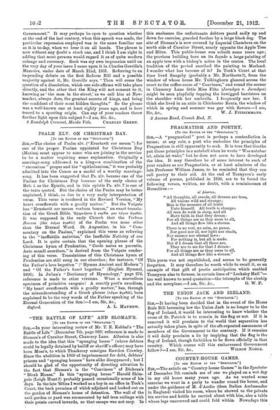PSALM XLV. ON CHRISTMAS DAY.
[To THE EDITOR OF ZEE "SPECTATOR."] But,—The choice of Psalm xlv. ("Eructavit cor meum ") for one of the proper Psalms appointed for Christmas Day (Mating) must appear to some who are joining in the service to be a matter -requiring some explanation. Originally a marriage-song addressed to a king—a combination of the " encomium " proper and the " epithalamium," it was probably admitted into the Canon as a model of a worthy marriage- song. It has been suggested that Ps. xlv. became one of the Psalms for Christmas Day because of the early choice of Heb. i. as the Epistle, and in this epistle Ps. xlv. 7 is one of the texts quoted. But the choice of the Psalm may be better explained, I think, as due to a very early interpretation of -verse. This verse is rendered in the Revised Version, "My heart overfloweth with a goodly matter." But the Vulgate has "Eructavit cor meum verbum bonum," an exact transla- tiaa of the Greek Bible, 'EtapEtlfare .1? Impala pou xdrn, ayaeOr. It was supposed in the early Church that the Verbum Bonunt (the Aiyos ayallIds) of the Psalm was none other than the Eternal Word. St. Augustine, in his " Com- mentary on the Psalms," explained this verse as referring to the " ineffabilia nativitas," the Ineffable Nativity of our Lord. It is quite certain that the opening phrase of the Christmas hymn of Prudentius, "Corde natus ex parentis, Ante mundi exordium," is derived from the Vulgate render- ing of this verse. Translations of this Christmas hymn of Prudentius are still sung in our churches ; for instance, "Of -the Father's love begotten" (" Hymns Ancient and Modern ") and " Of the Father's heart begotten" (English Hymnal, 1906), In Julian's " Dictionary of Hymnology," page 276, reference is made to other versions. What a marvellous specimen of primitive exegesis! A courtly poet's exordium, "My heart overfloweth with a goodly matter," has, through the misunderstanding of a Greek phrase (xbyos ds), been explained fe be the very words of the Father speaking of the _Eternal Generation of the Son !—I am, Sir, &c.,










































 Previous page
Previous page